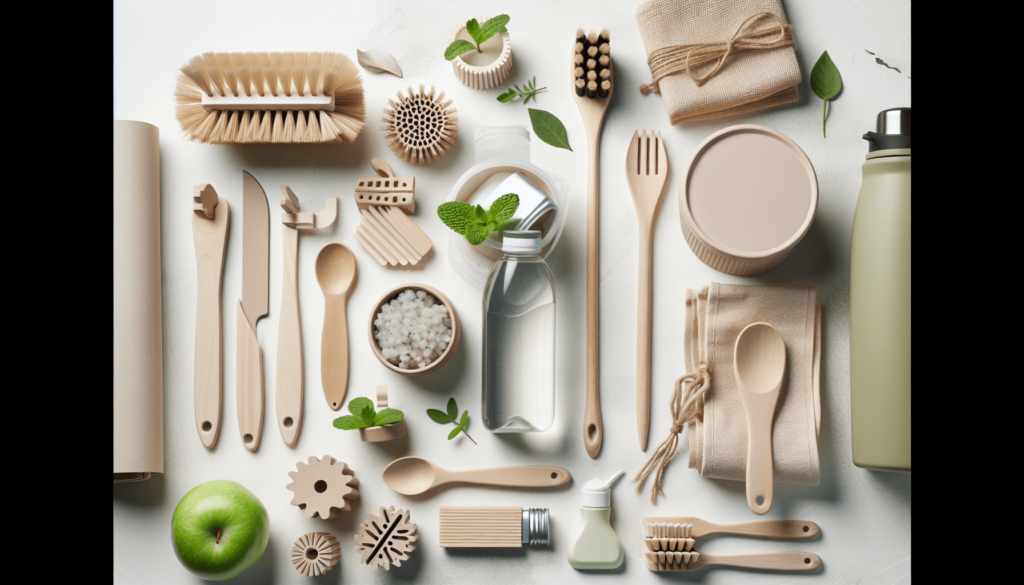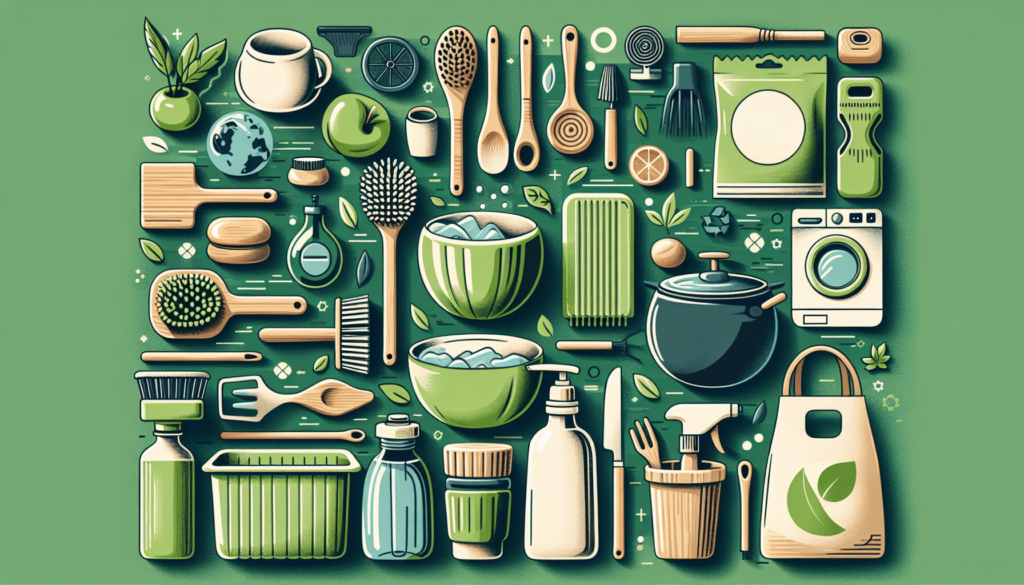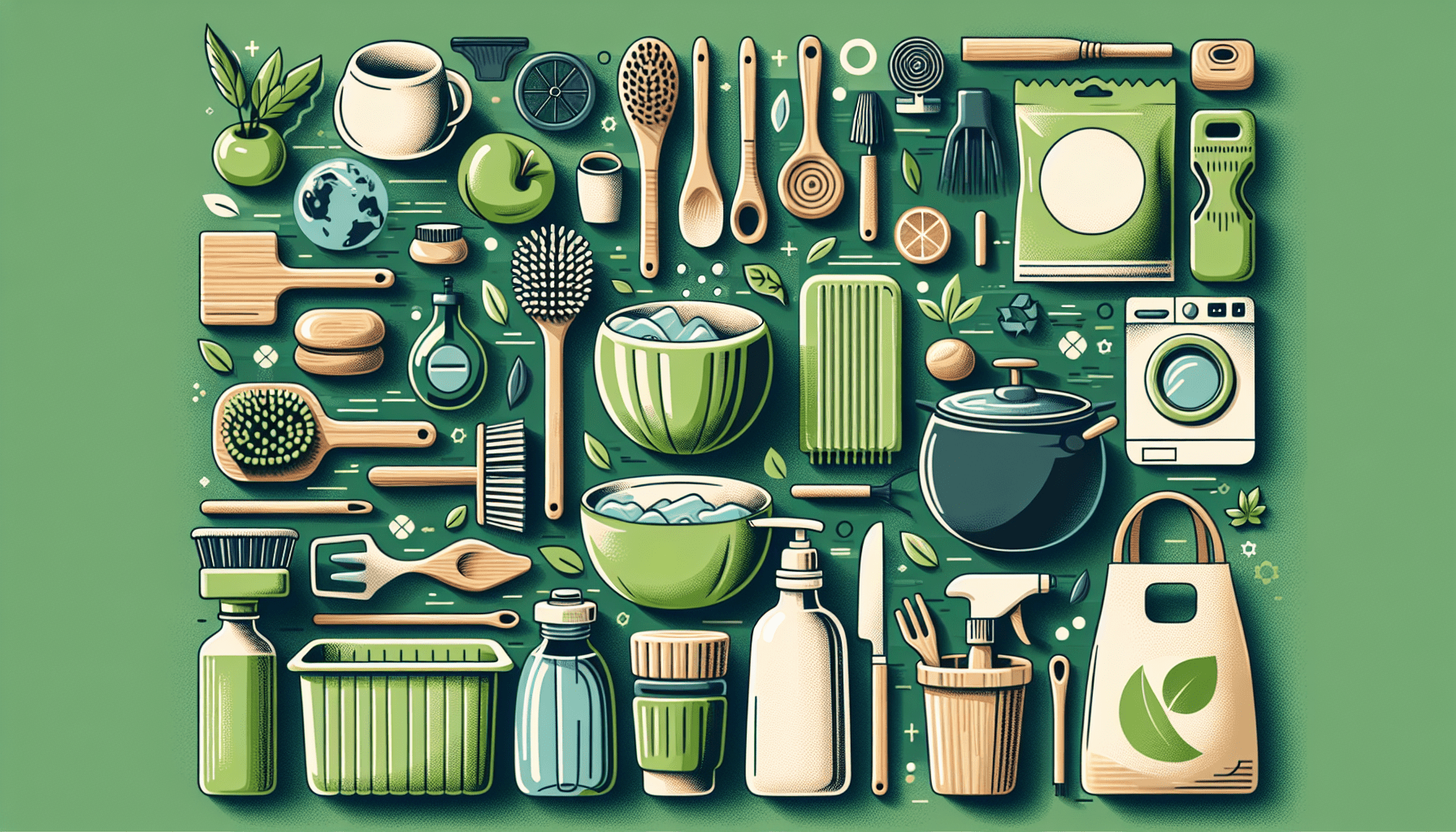Let’s talk about sustainable kitchen products – the perfect solution for those who want to make environmentally-friendly choices while cooking up a storm. In this comprehensive guide, we’ll explore a range of eco-friendly alternatives that are not only good for the planet but also for your wallet. From reusable food storage options to energy-efficient appliances, we’ll take you on a journey to help transform your kitchen into a sustainable haven. So, get ready to embrace greener living without sacrificing style or functionality as we navigate through the world of sustainable kitchen products.
Reusable Food Storage
Glass containers
When it comes to storing food, glass containers are an excellent choice. Not only are they reusable, but they are also non-toxic and safe for both you and the environment. Glass containers are versatile and can be used to store a wide range of foods, from leftovers to meal preps. They are also microwave and oven safe, making reheating a breeze. Moreover, glass containers are easy to clean, ensuring that your food storage remains hygienic.
Silicone food storage bags
Say goodbye to single-use plastic bags and hello to silicone food storage bags. These innovative bags are not only reusable, but they are also leak-proof and suitable for a variety of purposes. Whether you want to store snacks, freeze leftovers, or marinate meats, silicone food storage bags have got you covered. They are made from non-toxic materials and can be easily cleaned in the dishwasher, making them a convenient and eco-friendly choice.
Beeswax wraps
If you’re looking for a more sustainable alternative to plastic wrap, beeswax wraps are a fantastic option. Made from a combination of beeswax, cotton fabric, and jojoba oil, these wraps are perfect for wrapping up sandwiches, covering bowls, or keeping produce fresh. Beeswax wraps are washable and can be reused multiple times, reducing the need for single-use plastic wrap. Plus, they come in various sizes and designs, adding a touch of natural beauty to your kitchen.
Eco-Friendly Cleaning Tools
Biodegradable dish brushes
Gone are the days of plastic dish brushes that end up in landfills. Biodegradable dish brushes are an eco-friendly alternative that will leave your dishes sparkling clean. Made from sustainable materials such as bamboo or coconut coir, these brushes are durable, compostable, and effective at removing grime and food particles. They are a great addition to any kitchen looking to reduce its environmental impact.
Bamboo scrub brushes
For tougher cleaning tasks, bamboo scrub brushes are the way to go. These brushes are made from sustainably sourced bamboo and natural bristles, making them an eco-friendly choice for scrubbing pots, pans, and dishes. Their sturdy construction ensures that they can handle even the toughest grease and grime, while their biodegradable nature means they won’t contribute to landfill waste.
Reusable cleaning cloths
Instead of using disposable paper towels, opt for reusable cleaning cloths. These cloths are made from materials like cotton or microfiber and can be washed and reused multiple times. They are highly absorbent and effective at cleaning up spills, wiping countertops, and even dusting surfaces. By using reusable cleaning cloths, you’ll not only save money in the long run but also reduce your environmental footprint.

Compost Bins and Organic Waste Management
Countertop compost bins
If you want to reduce your organic waste and create nutrient-rich compost for your garden, a countertop compost bin is a must-have. These bins are compact and designed to sit on your kitchen countertop, making it easy to dispose of food scraps while cooking or cleaning up. They often come with a charcoal filter to minimize odors and can be easily emptied into a larger outdoor compost bin or picked up by a composting service.
Indoor compost tumblers
For those with limited outdoor space, indoor compost tumblers are a fantastic solution. These compact systems allow you to compost food scraps right in your kitchen, using worms or microorganisms to break down the organic waste. Indoor compost tumblers are odor-free and come with a mechanism to easily turn the compost, ensuring proper aeration and decomposition. They are an excellent option for apartment dwellers or anyone looking to minimize their carbon footprint.
Outdoor compost bins
If you have a backyard or outdoor space, consider setting up an outdoor compost bin. These bins come in various sizes and designs, allowing you to choose one that suits your needs. Outdoor compost bins are ideal for composting a larger amount of organic waste, including yard trimmings and garden waste. By composting your organic waste, you’ll not only reduce landfill waste but also create nutrient-rich soil for your garden.
Water and Energy Saving Appliances
Energy-efficient dishwashers
When it comes to saving both water and energy, investing in an energy-efficient dishwasher is a wise choice. These dishwashers are designed to use less water and electricity while still providing excellent cleaning performance. They often have various cycle options and sensors that adjust the water and energy usage based on the size and dirtiness of the load. By using an energy-efficient dishwasher, you can save both money and resources in the long run.
Water-saving faucets
To reduce water waste in your kitchen, consider installing water-saving faucets. These faucets are designed to regulate the flow of water, allowing you to use less water without sacrificing functionality. Some water-saving faucets come with aerators that mix air with the water, reducing consumption without compromising water pressure. By installing water-saving faucets, you can significantly reduce your water usage and contribute to a more sustainable future.
Induction cooktops
Induction cooktops are a great choice for those looking to save energy in the kitchen. Unlike traditional gas or electric cooktops, induction cooktops use magnetic fields to heat the cookware directly, resulting in faster cooking times and energy efficiency. They respond quickly to changes in temperature, allowing for precise cooking control. Induction cooktops also have the advantage of being safer, as they don’t generate heat directly and cool down quickly after use.

Sustainable Cookware and Utensils
Stainless steel cookware
When it comes to sustainable cookware, stainless steel is a top choice. Stainless steel is durable, long-lasting, and resistant to corrosion, making it an excellent investment for your kitchen. It is also non-toxic, non-reactive, and easy to clean. Stainless steel cookware distributes heat evenly, reducing the risk of hot spots and ensuring consistent cooking results. By choosing stainless steel cookware, you can minimize your environmental impact and enjoy high-quality cooking performance.
Cast iron pans
Cast iron pans are another sustainable option for your kitchen. These pans are incredibly durable and can last for generations with proper care. Cast iron pans are versatile and suitable for a wide range of cooking methods, including frying, sautéing, baking, and even grilling. They have excellent heat retention and distribution properties, making them ideal for achieving a perfect sear or bake. By choosing cast iron pans, you’ll not only have a reliable cooking tool but also reduce the need for disposable or non-durable cookware.
Bamboo utensils
Bamboo utensils are a sustainable alternative to traditional plastic or metal utensils. Bamboo is a fast-growing and renewable resource, making it an eco-friendly choice for utensil production. Bamboo utensils are sturdy, lightweight, and resistant to heat and moisture. They can be used for cooking, serving, and even eating, and are easy to clean. By switching to bamboo utensils, you can minimize your reliance on single-use plastics and contribute to a greener planet.
Zero Waste Food Storage and Shopping
Reusable grocery bags
When it comes to zero waste shopping, reusable grocery bags are a game-changer. These bags are made from durable materials such as cotton, canvas, or recycled plastic, and can be used over and over again. By using reusable grocery bags, you can significantly reduce your consumption of single-use plastic bags, which contribute to environmental pollution. Many stores also offer discounts or incentives for bringing your own bags, making it a win-win for both you and the planet.
Mesh produce bags
In addition to reusable grocery bags, mesh produce bags are a must-have for zero waste shopping. These bags are perfect for storing and transporting fruits, vegetables, and bulk items. Mesh produce bags are lightweight, breathable, and washable, ensuring that your produce stays fresh and free from harmful chemicals. By using mesh produce bags, you can eliminate the need for single-use plastic produce bags and minimize plastic waste.
Bulk food storage containers
To further reduce waste in your kitchen, consider using bulk food storage containers. These containers are designed to hold bulk items such as cereals, grains, nuts, and dried fruits. They are made from durable materials like glass or stainless steel and often come with airtight seals to maintain freshness. Bulk food storage containers allow you to buy in larger quantities, reducing packaging waste and saving money in the long run. They are a convenient and sustainable solution for pantry organization.
Organic and Non-Toxic Food Preparation
Organic cutting boards
When it comes to food preparation, choosing organic cutting boards is a smart choice. Organic cutting boards are made from materials such as bamboo, wood, or natural fibers, and are free from harmful chemicals and toxins. They are non-porous and resistant to bacteria, making them hygienic and safe for food preparation. Organic cutting boards are also durable and gentle on knives, ensuring that your culinary tools stay in top condition.
BPA-free food storage containers
To ensure that your food is stored safely, opt for BPA-free food storage containers. BPA (Bisphenol A) is a chemical often found in plastic containers and can leach into food, posing potential health risks. BPA-free food storage containers are made from materials like glass, stainless steel, or BPA-free plastics, ensuring that no harmful chemicals interact with your food. These containers are durable, reusable, and suitable for a variety of food storage needs.
Natural fiber kitchen towels
Ditch the disposable paper towels and switch to natural fiber kitchen towels. These towels are made from materials like cotton or bamboo and can be washed and reused multiple times. Natural fiber kitchen towels are highly absorbent and excellent at cleaning up spills, drying dishes, and wiping countertops. By using natural fiber kitchen towels, you can significantly reduce your paper towel consumption and contribute to a more sustainable kitchen.
Energy-Efficient Kitchen Lighting
LED light bulbs
To save energy and reduce your carbon footprint, consider switching to LED light bulbs in your kitchen. LED bulbs are incredibly energy-efficient and have a longer lifespan compared to traditional incandescent bulbs. They emit a bright, focused light that illuminates your kitchen while using less electricity. LED bulbs also produce less heat, reducing the strain on your cooling system during the warmer months. By using LED light bulbs, you can enjoy energy savings and create a more sustainable kitchen environment.
Under cabinet lighting
Under cabinet lighting is not only functional but can also be energy-efficient. These lights are installed underneath your kitchen cabinets, providing direct illumination to your countertop workspace. By using LED under cabinet lights, you can save energy and reduce the need for overhead lighting. They are often equipped with sensors or timers, allowing you to control when they are on or off. Under cabinet lighting enhances the ambiance of your kitchen while minimizing energy wastage.
Smart lighting systems
For advanced energy efficiency, consider installing a smart lighting system in your kitchen. These systems enable you to control and automate your kitchen lighting using a smartphone app or voice commands. Smart lighting systems allow you to adjust the brightness, color, and timing of your lights, ensuring that you only use energy when needed. They can also be set up to respond to natural light levels, further optimizing energy usage. By investing in a smart lighting system, you can create a more sustainable and convenient kitchen lighting experience.
Recycled and Sustainable Kitchen Flooring
Bamboo flooring
Bamboo flooring is an eco-friendly choice for your kitchen. Bamboo is a fast-growing grass that can be harvested sustainably without causing deforestation. Bamboo flooring is durable, moisture-resistant, and easy to maintain, making it an excellent option for high-traffic areas like the kitchen. It comes in various colors and styles, allowing you to choose a flooring design that suits your kitchen aesthetic. By choosing bamboo flooring, you can enjoy a beautiful and sustainable kitchen flooring solution.
Cork flooring
Cork flooring is another sustainable option that offers numerous benefits for your kitchen. Cork is made from the bark of the cork oak tree and is a renewable and biodegradable material. Cork flooring is naturally resistant to mold, mildew, and insects, making it a hygienic choice for the kitchen. It is also comfortable to walk on, as it provides cushioning underfoot and absorbs sound. Cork flooring comes in a variety of styles and finishes, allowing you to create a unique and sustainable kitchen space.
Recycled glass tiles
For a stunning and eco-friendly kitchen flooring option, consider recycled glass tiles. These tiles are made from recycled glass, often sourced from discarded bottles or windows, and are transformed into stylish and durable flooring. Recycled glass tiles are available in various colors, sizes, and patterns, allowing you to create a unique design for your kitchen. By choosing recycled glass tiles, you are diverting waste from landfill and giving it a new life as a beautiful and sustainable flooring material.
Water Filtration Systems
Reverse osmosis filters
To ensure that your drinking water is clean and free from contaminants, consider installing a reverse osmosis water filtration system in your kitchen. Reverse osmosis filters use a multi-step process to remove impurities, including bacteria, viruses, chemicals, and heavy metals, from your tap water. They are highly effective at producing clean and pure water for drinking and cooking. Reverse osmosis filters often come with a dedicated faucet and can be easily installed under your kitchen sink.
Activated carbon filters
Activated carbon filters are another popular choice for water filtration in the kitchen. These filters work by adsorbing and trapping impurities through the porous surface of activated carbon. They effectively remove chlorine, sediment, odors, and unpleasant taste from your tap water, improving its overall quality. Activated carbon filters can be installed in a variety of forms, including faucet-mounted filters, pitcher filters, or under-sink filters. By using activated carbon filters, you can enjoy great-tasting and clean water without the need for bottled water.
UV purification systems
For an advanced water purification solution, consider UV (ultraviolet) purification systems. These systems use UV light to disinfect water by deactivating bacteria, viruses, and other microorganisms. UV purification is a chemical-free method that can effectively eliminate harmful pathogens and ensure the safety of your drinking water. UV purification systems are often installed at the point of entry into your home’s water supply or can be used in conjunction with other filtration methods. By using UV purification systems, you can have peace of mind knowing that your kitchen water is safe and healthy.
In conclusion, adopting sustainable kitchen products is not only beneficial for the environment but also for your overall well-being. By choosing reusable food storage options, eco-friendly cleaning tools, composting organic waste, using water and energy-saving appliances, opting for sustainable cookware and utensils, and incorporating zero waste practices into your food storage and shopping habits, you are actively contributing to a greener future. Additionally, by considering organic and non-toxic food preparation methods, energy-efficient kitchen lighting, recycled and sustainable flooring options, and water filtration systems, you can create a kitchen that is both environmentally conscious and aesthetically pleasing. So, let’s embark on this sustainable kitchen journey together and make a positive impact, one eco-friendly product at a time.

